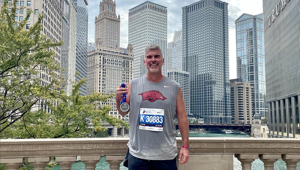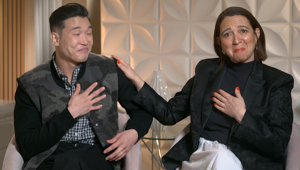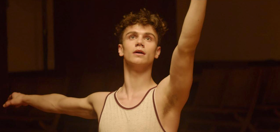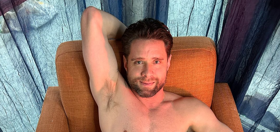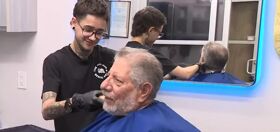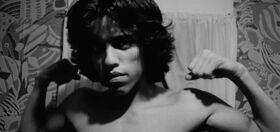
A great director doesn’t hold back.
Case in point: Ry Russo-Young, the talented filmmaker of the dramas Before I Fall, The Sun is Also a Star, as well as several episodes of the Marvel TV series Cloak & Dagger. Now, a decade into her career, Russo-Young dives into her most personal project to date…one that puts her own family history on full display. Nuclear Family airs Sundays on HBO Max, with the finale set for October 10.
Nuclear Family chronicles Ry’s upbringing as the daughter of a lesbian couple, Robin Young and Sandra Russo (who generally prefers to go by Russo) during the 1980s and 90s. Russo and Robin conceived both Ry and her sister Cade through sperm donations by gay men. By the time Cade & Ry started school, the two girls began asking about the identity of their donors. Enter Tom Steele, Ry’s donor, a successful attorney in a long-term relationship with his boyfriend Milton. Together, Tom & Milton also raised a son, Jacob, together. For several years, the two couples and their children blended their families, until an argument between the parents fractured their relationship. Then Tom decided to sue for joint custody of Ry, resulting in a four-year lawsuit that terrorized the young girl.
Now grown, Nuclear Family represents Russo-Young’s quest to digest the lawsuit, her childhood relationship with Tom, and the feelings of pain and anger that have plagued her since childhood. The resultant documentary series paints Robin, Russo, Tom and their legal battles in a new, more challenging, light, and finds Ry asking very difficult questions about her family history.
How about we take this to the next level?
Our newsletter is like a refreshing cocktail (or mocktail) of LGBTQ+ entertainment and pop culture, served up with a side of eye-candy.
Nuclear Family left us fraught and pensive in a way few series ever do. Naturally then, we had to snag some time with Russo-Young to chat about the series, the revelations into her family history and the catharsis she found in creating art. The finale of Nuclear Family airs on HBO Max on October 10.
So why now? Why revisit this awful, painful saga of your family now?
There are a few different reasons. I think the big reason is that I have children of my own. Becoming a parent and realizing the stakes of that relationship—how much I love and care about my children, how I worry about them. The thought of having that control taken away from me is so brutal on a gut level. I think I was able to understand the story on a whole other level after becoming a parent.
At what point did you decide to do a documentary over a scripted feature?
It was Summer 2019 that I realized it was ok that I didn’t know certain things about the story. I didn’t really know Tom’s perspective, and I didn’t know how I felt. That was always the hard part in the fiction—it never felt right. I realized in a documentary I could go find those things out, and that would become part of the film. It would make the film richer to do that.

It does. I was left with a question of it could even work as a narrative dramatization. There’s so much nuance we get just from watching these people that adds to that richness, and to the ambiguity of it all. So when you approached your moms and sister about doing the series as a doc, how did they react?
Because I had been trying to figure out this story for so long, I don’t think anyone was surprised at all. I had interviewed them all in 2014, not because I was making the movie, but because I knew I was going to make the movie someday, and it would be important. I was afraid everyone was getting too old to articulate what happened. I’ve also been filming my family my whole life. So when I whip out my video camera nobody is surprised.
That makes perfect sense. Now, the flip side of that: when you reached out to Tom’s side—and I don’t like saying his “side,” but I’m not sure how else do label it—
I know, me too.
It’s more complicated than that. But when you reconnect with people like Jacob or Chris Arguedas [the family friend who found Tom as a donor], were they reluctant? Were they skeptical?
People were pretty skeptical, depending on the person. Jacob was the least skeptical and really helpful in connecting me with other people like Marilyn Waller. He sent the word out through Tom’s circle that I was not regurgitating the story they saw in the press 20 years earlier. I was coming at it from an honest place, and I’m very grateful to him. But a lot of it was just conversations that I had to have about my intentions.
Oh sure.
I was also surprised they wanted to talk to me.
Really? Why was that so surprising?
Well, I guess it wasn’t so much that they wanted to talk to me, it was that they had so much to say.
Interesting.
I’m generalizing, but they felt like they had not been heard. They felt like Tom’s perspective had not been portrayed in the media and had never been heard. In a sense, I was the most important person that needed to hear it. Chris said to me “I’ve been waiting 30 years for you to come talk to me.”
Wow. That’s heavy.
It was.
I’d add that I really responded to Chris—she was so candid in everything she said. She’s also the only person, I think, in the entire series that says “We f*cked this up for you.”
Mmmhmmm.
That speaks volumes.
Absolutely. Chris and I have texted three times in the past 24 hours. She came to Telluride and watched the movie there. I’d say through the process of making the show and reconnecting, it’s been nice to get to know her as an adult. I find her fascinating and incredibly intelligent and charismatic.

Very much so. One major element of this series is that memory is plastic, and it is very much shaped by other circumstances and moods. There’s a clip—I think from Leeza—where you say you’d only met him a couple of times. That’s simply not true. Were you aware, at age 16, that you were saying something factually inaccurate, or did you really believe that?
I think truly believed that. I think the process of the lawsuit made Tom—it’s almost like if there was an image to it, he was an inch away from my face, and he was floating off into outer space. I was so afraid of being taken away, of the process, of the system, of losing my family—it all created this distance between us. For me, psychologically, I didn’t even know who he was by that point. And I hadn’t seen him since I was nine. I was estranged from everything that happened.
What kind of other memories were jogged for you?
Hmm. Little pieces came back to me throughout. What’s interesting to me is the relationship between memory and filming things, footage. Sometimes I had trouble understanding what was a memory and what I was remembering by virtue of having it filmed and having the photograph in my image bank. That was the thing—reconciling those disparate memories: the feelings of fear and betrayal and warmth and intimacy that I felt with Tom.
Have you noticed a difference in sympathy or reaction along gender lines or sexuality lines? Men more sympathetic to Tom? Women more sympathetic to your moms?
I don’t think the series has really shown widely enough to make those generalizations. What I have noticed, that I really love that I’m happy and proud about, is that the series seems to hit both straight and gay people in different ways, and men and women, on an emotional level. I just got a wonderful email from a gay man telling me how much he empathized with Tom and felt for him. I love that it’s not a one-sided story. Only now with the progress we’ve had can we tell that story.
Related: Trump is trying to tear apart this gay family because one of them is an immigrant
Are you still in touch with Jacob?
Oh yeah. I’m in touch with everyone in the film. All the subjects I’m in touch with.
So when you show them the movie and talk about how they are portrayed, how are they reacting? Are people coming out with a perspective that has totally changed?
I don’t think I’ve changed anybody’s mind really. I wish I could say everybody started to go hug, but that didn’t happen. What my mom—Russo—said to me this morning is that the reaction to the film has treated our family like a family for the first time ever.
Wow.
That has made her both proud and less defensive. That’s really meaningful to me because I agree with her, and I know what she means. When people say “Ry and her parents,” that’s new. I’ve never seen that before.
That’s really crazy. Now, there is a moment in Episode 3 I want to ask about. You have a conversation with your moms about the notion of erasing history. Russo says something that really stood out to me. She says “This isn’t the family we wanted, we planned for.” And you are in a unique position to address this. Is that queer privilege? We talk about how privilege of any kind sort of renders people oblivious to the tribulations of others.
Mmhmm.
When same-sex couples have children, we get to plan it. We have them when we want, with the people we want to have them with. Straight people don’t always have that luxury, that choice. That raises a larger question too: when your family started to change, when Tom & Milton entered the picture—not necessarily as parents, but as family, as people you loved—was that something your moms were not prepared to accept?
I think they were absolutely willing and wanting them to be involved in our lives. But I think they wanted and expected to keep their role as parents and not have that feel threatened. I think what happened was that started to feel like it was slipping because of the conflict with Tom & Milton. That felt challenged, and very scary.

Well and that’s the other reason I’m glad you did this as a documentary. Watching the film, I couldn’t blame anyone for how they felt, even if I could quibble with individual choices or actions. But nobody was wrong in this for feeling the way they did, particularly in a time where same sex couples lacked legal rights. Your moms are trailblazers to raise children at the time they did.
I think when we watch something as heated and passionate as this, we do look and want to establish blame. To me, the thing that has become more clear as to who to blame, it’s the system. It didn’t allow for more nuanced relationships. It pushed my mothers to not be protected and therefore be very defensive, and it pushed Tom to go to this nuclear place as a result of feeling he had no other way. It pushed everyone to the extreme.
You close the film by saying you choose to focus on the love rather than the pain or trauma or fear of living through the lawsuit. What does that love feel and look like to you now? How do you talk about Tom or your moms differently?
I think it’s really about the peace I feel toward Tom and those around him. I can hold the negative parts that I only saw for so long. But I can also acknowledge and appreciate and cherish the good moments—all the good stuff he gave me. I’m very grateful. I wouldn’t exist without him. And we share many things.
I would be remiss not to point out you started making movies with him, and now here you are with this great career as a filmmaker.
Yeah. Totally. And I think something about his drive I share. He was always very determined. When he started something, he was going to finish. Making movies is very much like that. It took me 20 years to make this one.
Tell me more about that peace. I can only imagine what it was like making this, on a day-to-day level.
I had hives for two years.
Seriously? Oh you poor thing.
I saw an allergist. I take medication. It was stressful.
So what have you been able to forgive or let go of by going through this process?
The anger. I was angry for so many years. I think I was actually angry at my moms, but I was also angry at Tom for doing this to me. I don’t want to be angry anymore. I’m not. There’s something about rising above the whole thing that I feel like this series has allowed me to do. I feel much lighter as a person now.

You mentioned that becoming a mom was what allowed you to confront this story. How has becoming a mom changed your perspective as an artist?
I think the biggest thing is that before I had a kid, I kind of thought about myself a lot. That’s the truth—you are the center of your universe. That child became the center of my universe, had to become the center of my universe. It’s very humbling. It made me a more kinder, more empathetic person.
Did you ever find yourself wishing you could talk to Tom?
Absoulutely.
If was here now, what would you tell him?
I’d show him the show and get his thoughts on it.
[Laughter]
And if you could go back and tell Tom & Milton and your moms one thing circa 1991—before the lawsuit—what would it be?
I’d probably tell Tom “Don’t sue.” I’d say don’t use the law, just give it a minute. The lawsuit is where it all went so extreme. I wonder if they had all just calmed down for five minutes and talked—maybe there would have been another way. But that’s always so easy to say in retrospect.
Of course. What about your moms?
Probably “Take a deep breath.” I know that from Russo—she’s a hothead, like Sonny in The Godfather.
[Laughter]
You can’t expect her to change in 24 hours. You’ve got to give her a few days.
And I’m sure more than anything, both Robin and Russo are very proud of you right now.
Oh of course. Yes. Embarrassingly so, like any Jewish mothers would be.
The finale of Nuclear Family airs on HBO on October 10.



